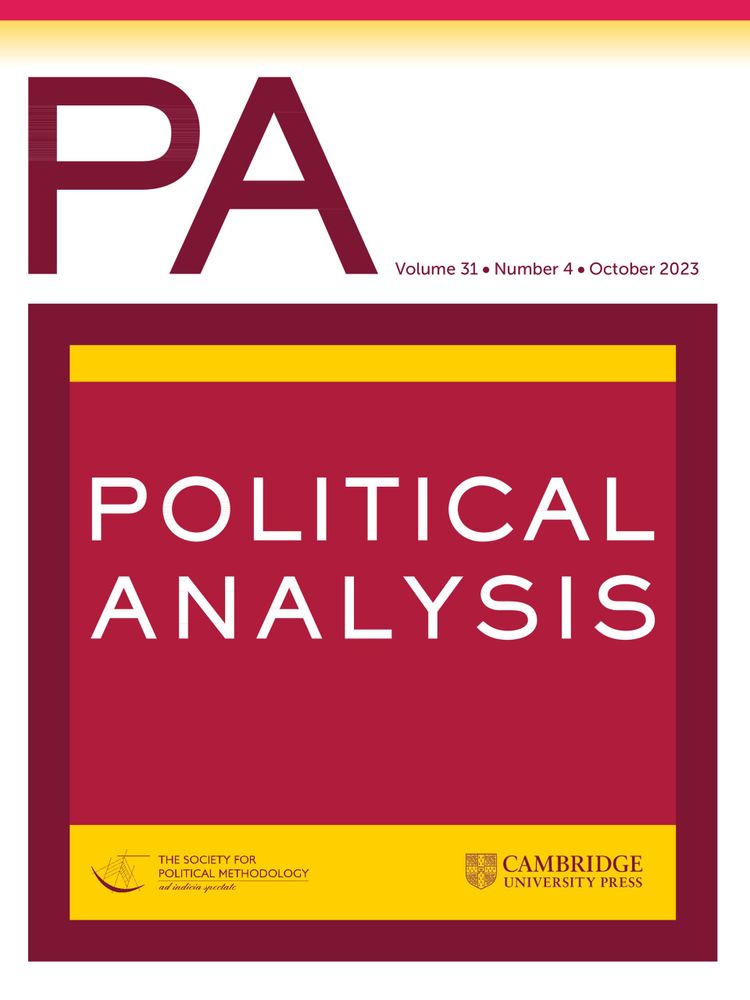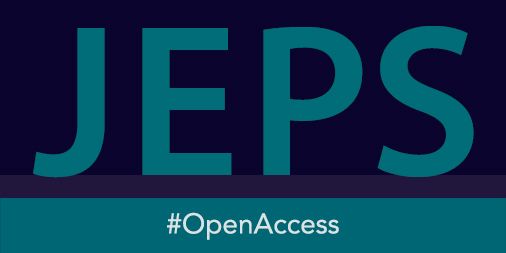This paper was a blast to work on. The challenge: present party positions across many issues, in real time, using language voters actually use. 🧵 on why we went with a more involved retrieval-based approach and where I think these tools are headed.
12.12.2025 14:28 — 👍 10 🔁 4 💬 1 📌 0

Survey Professionalism: New Evidence from Web Browsing Data | Political Analysis | Cambridge Core
Survey Professionalism: New Evidence from Web Browsing Data
They find that survey professionalism is common, but there is limited evidence that survey professionals lower data quality. Professionals do not systematically differ from non-professionals and don’t exhibit more response instability. Read the paper here: www.cambridge.org/core/journal...
04.12.2025 18:05 — 👍 1 🔁 3 💬 0 📌 0

Currently in FirstView: In “Survey Professionalism: New Evidence from Web Browsing Data,” Bernhard Clemm von Hohenberg, @tiagoventura.bsky.social, Tiago Ventura, @jonathannagler.bsky.social, @ericka.bric.digital, & Magdalena Wojcieszak provide evidence on survey professionalism across three samples.
04.12.2025 18:05 — 👍 7 🔁 6 💬 1 📌 0

Survey experiments' popularity in political science is getting attention. What is good and bad about them? How can one maximize their benefits and mitigate their downsides?
Greg Huber and I wrote up our thoughts:
Paywalled: doi.org/10.1016/bs.h...
Free: m-graham.com/papers/Huber...
04.12.2025 13:54 — 👍 94 🔁 23 💬 1 📌 4

NEW PAPER w/ @cselmendorf.bsky.social & @jkalla.bsky.social:
An under-appreciated reason why voters oppose dense new housing, especially in less-dense neighborhoods: they think it looks ugly and want to prevent that, even in other neighborhoods.
Some of what we think is NIMBYism might not be!
25.11.2025 20:12 — 👍 108 🔁 23 💬 35 📌 42
PNAS
Proceedings of the National Academy of Sciences (PNAS), a peer reviewed journal of the National Academy of Sciences (NAS) - an authoritative source of high-impact, original research that broadly spans...
A thread on our recent paper (w/Raihan Alam @raihanalam) in PNAS on why punishment often fails and what it means for crime, cooperation, democracy, and the rule of law. I’m super excited for it, it’s the lab’s most extensive experimental work to date. Check it out! 1/
www.pnas.org/doi/full/10....
19.11.2025 23:39 — 👍 28 🔁 11 💬 2 📌 1
Do any meta-analyses or other reflection pieces exist that catalog the sorts of mechanisms specifically, and outcomes generally, studied as consequences of providing white Americans information on their declining population share?
19.11.2025 14:28 — 👍 2 🔁 4 💬 0 📌 0
OSF
(1/10) 🚨Preprint alert!🚨
In this article, I challenge claims of a generational rise of conservative men. In the media and recent academic publications, the so-called ‘youth gender gap’ has been interpreted as a generational phenomenon.
doi.org/10.31234/osf...
16.11.2025 14:24 — 👍 112 🔁 54 💬 5 📌 9
I still hear reviewer 2 saying "yes but in this case..."
12.11.2025 14:36 — 👍 4 🔁 0 💬 1 📌 0

✨New preprint! Why do people express outrage online? In 4 studies we develop a taxonomy of online outrage motives, test what motives people report, what they infer for in- vs. out-partisans, and how motive inferences shape downstream intergroup consequences. Led by @felix-chenwei.bsky.social 🧵👇
11.11.2025 16:34 — 👍 40 🔁 18 💬 1 📌 1

The image shows the paper's title and abstract.
New WP on political violence in democracies with the fantastic @dianebolet.bsky.social and @bjarneck.bsky.social. Sadly very topical, but with some positive results
osf.io/preprints/so...
1/
05.11.2025 14:00 — 👍 18 🔁 6 💬 1 📌 0

Very few Americans support actual political violence. Many more support intimidation.
Almost no one thinks it’s appropriate to kill your political opponents, but many more would dox them.
Very few Americans support actual political violence.
Many more support intimidation.
Almost no one thinks it’s appropriate to kill your political opponents, but many more would dox them.
Read the latest: goodauthority.org/news/very-fe...
31.10.2025 17:03 — 👍 10 🔁 7 💬 1 📌 0


After a huge post-election flip in economic perceptions, I thought Democrats and Republicans might be lying to pollsters to send a partisan message — but I was wrong!
New in the Journal of Experimental Political Science (open access): doi.org/10.1017/XPS....
27.10.2025 16:23 — 👍 94 🔁 43 💬 3 📌 8

BJPolS abstract discussing the impact of anti-corruption policies in electoral politics with a focus on recent elections around the globe.
#OpenAccess from August 2025 -
Cleaning up Politics: Anti-Corruption Appeals in Electoral Campaigns - cup.org/4msGB8X
"Surprisingly, a clean disciplinary record does not substantively enhance a candidate’s anticorruption appeal..."
- Sofia Vera
14.10.2025 02:00 — 👍 1 🔁 1 💬 0 📌 0
OSF
📣 MORAL APPEALS IN POLITICAL COMMUNICATION 📣
New version of @twidmann.bsky.social and my working paper answering:
* Have moral appeals increased over time?
* Is the tendency to moralize ideologically patterned?
* Are some topics consistently more moralized than others?
osf.io/preprints/os...
15.09.2025 07:46 — 👍 45 🔁 14 💬 2 📌 1

Summary of design and results from our three studies. (A: Design) Each study used a similar experimental design, measuring both positive and negative demand in an online experiment, with three commonly-used task types (dictator game, vignette, intervention). Our experiments had ns ≈ 250 per cell. (B: Results) Observed demand effects were statistically indistinguishable from zero. The plot shows means and 95% confidence intervals for standardized mean differences derived from frequentist analyses of each experiment and an inverse variance-weighted fixed-effect estimator pooling all experiments (solid bars). Prior measurements of experimenter demand from a previous dictator game experiment (de Quidt et al., 2018; standardized mean difference from regression coefficient) and a meta-analysis primarily including small-sample, in-person studies (Coles et al., 2025; Hedge’s g statistic) are also shown for comparison (striped bars). The main text includes Bayesian analyses that quantify our uncertainty.
We often hear from reviewers: "what about demand effects?" So we developed a method to eliminate them. Something weird happened during testing: We couldn’t detect demand effects in the first place! (1/8)
15.09.2025 17:18 — 👍 86 🔁 40 💬 3 📌 6

Abstract for paper: Scholars increasingly conceptualize populism by whether politicians use people-centric
and anti-elite appeals that pit a homogeneous people against a corrupt elite. These appeals
reflect “thin” ideology because they offer no programmatic content and thus politicians
must pair these appeals with more substantive positions, termed their “host” (or thick)
ideology, which often consists of nativism on the right (e.g., espousing anti-immigrant
positions) and socialism on the left (e.g., prioritizing redistribution). An emerging
literature has thus sought to estimate whether populists garner support due to their thin
ideology or their substantive host ideology. To date, no research has validated whether
populism treatments (1) truly operationalize populist thin ideology, and (2) do so without
manipulating host ideology. Results from three conjoint validation experiments fielded in
both the United States and the United Kingdom show that thin ideology treatments
successfully manipulate the underlying concepts but caution that some operationalizations
also affect perceptions of host ideology.

Shows that thin populism treatments shift perceptions of people-centrism and anti-elitism as expected

Shows that thin populism treatments can also affect perceptions of host ideology. In particular, using treatments such as "American people" affects perceptions of a candidate's position on immigration

Shows suggestive evidence that people are less likely to use populist thin ideology appeals as heuristics for inferring host ideology when partisan information is included
New preregistered report @jepsjournal.bsky.social
"Thin" populism treatments manipulate perceptions of people-centrism + anti-elitism
But: some treatments (e.g., "American people") affect perceptions of host ideology, complicating causal analyses of impact of populist rhetoric
cup.org/4n3DvZm
11.09.2025 14:32 — 👍 12 🔁 10 💬 2 📌 0

Participating
The Evaluation of Publication in Political Research study is open to serious producers and consumers of political research, including faculty in institutions of higher education, doctoral students,…
colleagues in political science. the formal update to the Garand and Giles journal ranking survey is now live. many of you will receive an email momentarily inviting you to participate. in the event you do NOT receive an invitation, please see this website to self-enroll. thanks! sharing = caring!
14.09.2025 19:30 — 👍 19 🔁 15 💬 2 📌 2


As the U.S. celebrates Labor Day, what do voters think about the working poor?
In POQ, Benjamin Newman shows that most blame structural problems for poverty among workers – but that race and personal experience shape views too.
Read now: doi.org/10.1093/poq/...
01.09.2025 15:01 — 👍 12 🔁 7 💬 0 📌 0

Logo of the Journal of Experimental Political Science (JEPS) featuring the acronym "JEPS" in large, white letters on a dark blue background, with the hashtag "#OpenAccess" in small letters.
#OpenAccess from @jepsjournal.bsky.social -
Do Immigrants’ Partisan Preferences Influence Americans’ Support for Immigration? - cup.org/4p2Xskp
- @danielmcdowell.bsky.social & David A. Steinberg
#FirstView
01.09.2025 13:30 — 👍 2 🔁 3 💬 0 📌 1

On Prolific, "we estimate that about 34% of online study participants use LLMs to answer open-ended questions atleast some of the time..."
Seems like a very timely paper for behavioural scientists using online samples: osf.io/preprints/so... ;
We really need more papers on this issue
29.08.2025 09:46 — 👍 195 🔁 80 💬 4 📌 7

Some people find politics interesting. Others do not. In a new paper, I show that appealing to MEANING increases political interest. In 6 experiments, connecting what people find meaningful in their lives to politics increases political interest. Link: osf.io/preprints/so...
29.08.2025 20:03 — 👍 9 🔁 7 💬 0 📌 0

screenshot of the top of the first page of the fall 2025 experiments section newsletter
There's a new issue of the section newsletter out! This one's on sample considerations in experiments: professional survey-takers, LLM usage, rural contexts, and more!
connect.apsanet.org/s42/newslett...
26.08.2025 15:08 — 👍 9 🔁 9 💬 1 📌 0
A publication that covers the nuts and bolts of political change: Boltsmag.org
Join the Disgustology community! A space for research on disgust across psychology, politics, biology & related fields. Created after Disgust Across Borders 2025 to share studies, build collaborations & connect perspectives across species.
Postdoctoral Research Fellow at the European University Institute. PhD from Harvard University.
European & US politics. Political representation, institutions and voters' decision-making. Political Economy.
Associate Professor, Department of Government, University of Bergen 🇧🇻 | activism, norms, political violence
Associate Prof. at Washington State University. Research focuses on African politics, political psychology, conflict processes, and antisemitism.
The Journal of Race, Ethnicity, and Politics is the official journal of the Race, Ethnicity, and Politics section of the American Political Science Association, published by @cambup-polsci.cambridge.org.
PhD candidate in cognitive psychology at Northeastern University | studying morality, misinformation, and social change | janeacierno.com
Political analysis and reporting free of tribal prejudices. Sign up for our newsletters here: https://thebulwark.com/subscribe
• Moral Minds Lab @msupsychology.bsky.social
• Lab director: @drmeltemyucel.bsky.social
• https://www.moralmindslab.com/
• email: moralmindslab@msu.edu
We are the Political Psychology Specialist Group of the Political Studies Association (@polstudiesassoc.bsky.social)
Web: www.psa.ac.uk/specialist-groups/political-psychology
Postdoc at Yale School of Management, interested in judgment and decision-making, research methods, and movies.
http://andres-montealegre.com/
associate prof of psychology at brooklyn college & cuny grad center, & assoc prof of phil at cuny grad center; interested in moral psych—how people judge what is right and wrong, and what they do with those judgments
We are an association of all AAUP members in Texas #HigherEd. Join us as we advocate for faculty and instructors through the state. Become involved in a local chapter or start one!
https://connect.aft.org/app/memberforms/8041A/JoinTheFight
Econ professor at Michigan ● Senior fellow, Brookings ● Intro econ textbook author ● Think Like An Economist podcast ● An economist willing to admit that the glass really is half full.
three language models in a trench coat
harvard psych (scholar.harvard.edu/xrg)
Ph.D student, UT Austin
Political Behavior, Public Opinion, Experimental Methods, REP
Assistant Professor of Political Science at Yale
mellissameisels.com
Political scientist
https://www.aidanmilliff.com
British, But In Las Vegas and NYC
ezitron.76 Sig
Newsletter - wheresyoured.at
https://linktr.ee/betteroffline - podcast w/ iheartradio
Chosen by god, perfected by science
CEO at EZPR.com - Award-Winning Tech PR
































